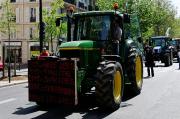
A baby yawns while swaddled in a teal blanket, adorned with a blue knitted hat featuring a white flower and red trim. An adult cradles the child, gently touching its head.
In 2023, Switzerland saw a historic low in its birth rate, with the number of children per woman dropping to 1.33, down from 1.39 in 2022.
Last year, a total of 80,000 children were born in Switzerland, marking a 2.8% decrease from the previous year. This decline affected both Swiss mothers and those with foreign nationality, although it was more pronounced among Swiss women (4.2%) compared to foreign nationals (0.8%), as reported by the Federal Statistical Office (FSO) on Thursday.
The FSO confirmed these figures as part of its population statistics released in April, reflecting a continuous downward trend since 2021. Notably, 56,100 children born last year were of Swiss nationality, while 23,900 had foreign nationality, resulting in 2,300 fewer births compared to the previous year. The drop in 2022 was even steeper, with 7,300 fewer babies, or an 8.1% decline.
In 2023
, the decline in births was more significant among women under 30, at 5.1%, compared to a 2.1% decline among those over 30. First births in the younger age group fell by 4.3%, while those aged 30-39 saw a 1.7% decline. Interestingly, among women over 40, births increased by 3.2%. The average age for first-time mothers rose slightly from 31.2 years in 2022 to 31.3 years.
Second births decreased by 2.8%, and third births saw the most substantial drop at 7.3%. This downward trend in the number of third children was consistent across all age groups but was particularly notable among mothers aged 30 to 39. Conversely, the number of fourth births saw a slight increase of 1.9% compared to the previous year. Photo by Andrés Nieto Porras from Palma de Mallorca, España, Wikimedia commons.








































